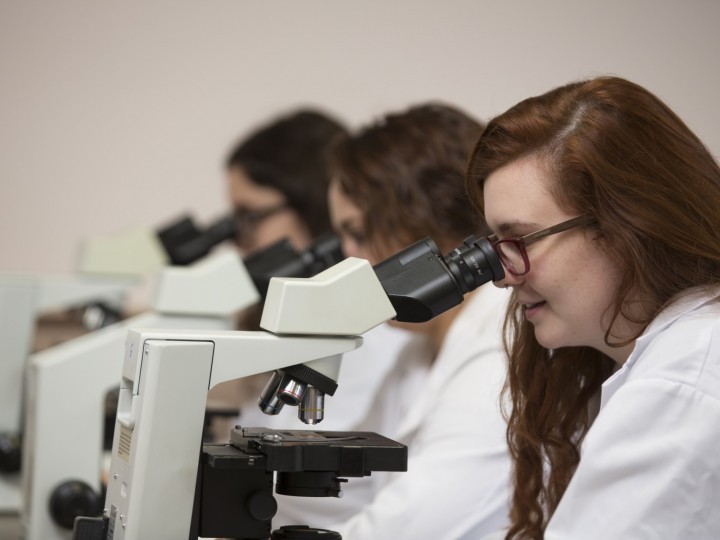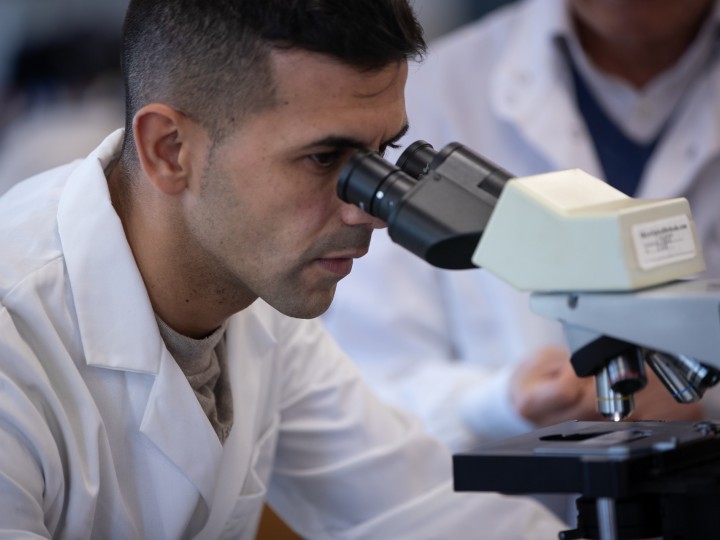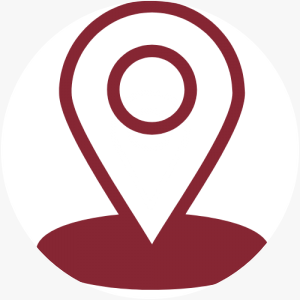Prepare to make a positive impact on human health with a cytotechnology degree from ACPHS.
Great patient care begins with an accurate diagnosis. By obtaining a master's degree in cytotechnology and molecular cytology, you can acquire the knowledge and visual skills necessary to assist the cytopathology team in making accurate and specific diagnoses that will aid in the development of appropriate treatment plans for patients dealing with infections, autoimmune diseases, or cancer.
As one of the oldest cytotechnology programs in the country, ACPHS’ masters in Cytotechnology and Molecular Cytology program is renowned for its leading-edge curriculum, 100% pass-rates on the national cytotechnologist certification exam administered by the American Society for Clinical Pathology (ASCP) Board of Certification (BOC), and 100% job placement rate.

Cytology is the study of living cells and the detection of various infections, autoimmune diseases, and abnormalities such as precancerous and cancerous cells. As a licensed cytotechnologist, you'll act as a cell detective – examining human cellular specimens to explain what is happening within a patient.
Successful cytotechnologists possess strong attention to detail and a passion for solving puzzles. But most of all, they share a desire to improve the health of patients – many of whom they may never even see.
Cytotechnologist jobs are found in hospital and private laboratories, university medical centers and government facilities. Because of the increased use of cytologic testing for the confirmation of disease, more cytotechnologists are needed.

ACPHS graduates have gone on to successful careers as cytotechnologists, lab supervisors, and cytology educators working at organizations like:
• Albany Medical Center
• St. Peter's Health Partners
• University of Rochester Medical Center
• Rochester Regional Health
• Roswell Park Cancer Institute
• Northwell Health
• Stony Brook Medicine
According to Salary.com, the median cytotechnologist salary with a master's degree is $84,838 - $89,287. Having a master's degree will position you well for advancement into senior laboratory roles as you gain more experience.

Not ready to relocate or settle into a position and seeking professional advancement? Our hybrid track allows you to complete the degree with utilizing our satellite extension site locations.
The hybrid track program will deliver didactic content through a combination of online synchronous lectures and asynchronous (recorded) lectures, learning in real-time alongside your peers at the Albany campus. You are expected to attend synchronous components of the program according to the schedule of in-person courses taught at the Albany campus. You will also be able to complete the asynchronous components of the program at a time of your choosing.

ACPHS has entered affiliation agreements with the following satellite extension sites that allow you to complete the laboratory/hands-on component of the program away from the Albany campus in a clinical setting under the supervision of a licensed cytotechnologist. Students can select their satellite extension site location based on proximity to their place of residence and/or work.
- UHS Wilson Medical Center, Johnson City, NY
- Arnot Ogden Medical Center, Elmira, NY
For more information, please contact the Program Director, Ms. Jenna LeBlanc
The laboratory/hands-on component will be delivered through a combination of online and in-person activities. Students will need to attend their satellite location daily for instruction and hands-on training. Our expert faculty are trained in using the Quality Matters Rubric to ensure the delivery of a high-quality online educational experience for students.
Clinical laboratories interested in becoming a satellite location for the MS Cytotechnology and Molecular Cytology program can contact Ms. Jenna LeBlanc.

The 58-credit program split between courses in cytotechnology (25 credits) and biomedical sciences (33 credits). The curriculum includes courses in gynelogic and non-gynecologis cytology, and Cellular Pathophysiology and Histology, which surveys the biochemical and molecular mechanisms underlying disease processes. You’ll take our Flow Cytometry course where you’ll cover topics like machine set-up and operation, fluorochromes and fluorescence, spectral overlap and compensation, experimental design, data collection and multi-parameter analyses and also develop critical skills in fine needle aspiration.

Clinical Rotations:
A broad range of clinical rotations are available to enhance your professional development and prepare you with hands-on skills. Students may choose among 40 different ACPHS partner sites to complete their rotations, where they will work under the guidance of a licensed professional. ACPHS' location close to major cities opens a variety of rotation options at locations throughout the Northeast and beyond, extending out to California.
Capstone Project:
During your final semester, you will be required to complete a three-credit capstone project that includes four components. The project allows you to explore various aspects of the field in greater depth, bringing together everything you’ve learned in the classroom, lab and in your rotations.
Instructor
jenna.leblanc@acphs.edu
518-694-7315
Albany, NY 12208
admissions@acphs.edu
518-694-7221

